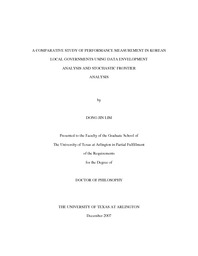
ATTENTION: The works hosted here are being migrated to a new repository that will consolidate resources, improve discoverability, and better show UTA's research impact on the global community. We will update authors as the migration progresses. Please see MavMatrix for more information.
Show simple item record
| dc.contributor.author | Lim, Dong Jin | en_US |
| dc.date.accessioned | 2008-04-22T02:41:33Z | |
| dc.date.available | 2008-04-22T02:41:33Z | |
| dc.date.issued | 2008-04-22T02:41:33Z | |
| dc.date.submitted | December 2007 | en_US |
| dc.identifier.other | DISS-1965 | en_US |
| dc.identifier.uri | http://hdl.handle.net/10106/763 | |
| dc.description.abstract | This study examines efficiency as a key component of performance, applies new performance measurement techniques to the measurement of local government performance, and verifies theoretical debates on economic, financial, political, and environmental factors related to performance in local government. Improving performance and promoting efficiencies in local government are important issues in both academic and practical public administration. Despite the remarkable development of performance measurement in local government since the 1990s, empirical evidence is still limited on the extent of the utility and practicability of performance measurement in local government.
<p> Results of this research are developed from a study of Korean local governments which have common central government funding, characteristics, and required expenditure record keeping. The results of the research study findings: 1) higher levels of employment of citizens relates to more efficient local governments; 2) local governments having lower expenditures and more independent revenue sources are more efficient local governments; 3) political factors such as mayors' political preferences and citizens' participation in voting during mayors' elections are not related to the efficiency of local government; 4) as the population size of a Korean city increases, the efficiency of the Korean city government increases until the range of population reaches 800,000; 5) increased numbers of public employees in Korean city governments results in decreased efficiency; and 6) consolidated Korean city governments are less efficient than non-consolidated city governments. Findings from this study suggest that in order to improve the performance of any local government there should be the following: smaller size of governments; competition between city governments; economies of scales in government; independent revenue sources; the application of benchmarks; and more performance measurements. | en_US |
| dc.description.sponsorship | Goldsteen, Joel | en_US |
| dc.language.iso | EN | en_US |
| dc.publisher | Urban & Public Affairs | en_US |
| dc.title | A Comparative Study Of Performance Measurement In Korean Local Governments Using Data Envelopment Analysis And Stochastic Frontier Analysis | en_US |
| dc.type | Ph.D. | en_US |
| dc.contributor.committeeChair | Goldsteen, Joel | en_US |
| dc.degree.department | Urban & Public Affairs | en_US |
| dc.degree.discipline | Urban & Public Affairs | en_US |
| dc.degree.grantor | University of Texas at Arlington | en_US |
| dc.degree.level | doctoral | en_US |
| dc.degree.name | Ph.D. | en_US |
Files in this item
- Name:
- umi-uta-1965.pdf
- Size:
- 971.8Kb
- Format:
- PDF
This item appears in the following Collection(s)
Show simple item record


